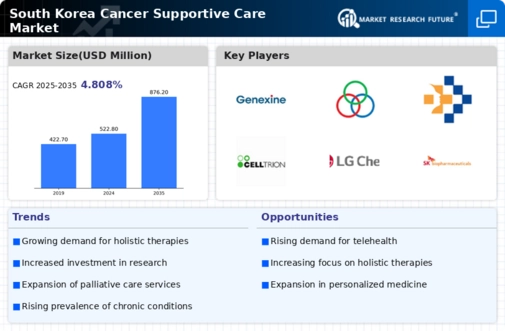Rising Cancer Incidence
The increasing incidence of cancer in South Korea is a primary driver for the cancer supportive-care market. According to the Korea Central Cancer Registry, cancer cases have been on the rise, with an estimated 250,000 new cases reported annually. This surge necessitates enhanced supportive care services to address the complex needs of patients. As the population ages and lifestyle factors contribute to higher cancer rates, the demand for supportive care services, including pain management and nutritional support, is expected to grow. The cancer supportive-care market is likely to expand as healthcare providers seek to improve patient outcomes and quality of life, indicating a robust market potential.
Government Policy and Regulation
Government policies and regulations play a crucial role in shaping the cancer supportive-care market. Recent initiatives aimed at improving cancer care infrastructure and funding for supportive services are likely to enhance access to care. The South Korean government has been increasing its investment in healthcare, with a focus on comprehensive cancer care. This includes support for programs that provide psychological counseling and nutritional assistance to cancer patients. As these policies evolve, they may create a more favorable environment for the growth of the cancer supportive-care market, ensuring that patients receive the necessary support throughout their treatment journey.
Increased Awareness and Education
There is a growing awareness of the importance of supportive care among patients, families, and healthcare professionals in South Korea. Educational initiatives aimed at informing stakeholders about the benefits of supportive care are gaining traction. This heightened awareness is likely to drive demand for services that enhance patient well-being during and after cancer treatment. As more individuals recognize the value of psychological support, pain management, and palliative care, the cancer supportive-care market is expected to expand. This trend indicates a shift towards a more holistic approach to cancer care, where supportive services are integrated into the overall treatment plan.
Growing Demand for Home-Based Care
The trend towards home-based care is becoming increasingly prominent in the cancer supportive-care market. Many patients prefer receiving care in the comfort of their homes, which can lead to improved satisfaction and quality of life. This shift is driven by advancements in telehealth and remote monitoring technologies, allowing healthcare providers to offer effective support without requiring patients to visit healthcare facilities. As the population ages and the preference for home care rises, the cancer supportive-care market is likely to see a significant increase in demand for home-based services. This trend suggests a transformation in how supportive care is delivered, emphasizing convenience and patient-centered approaches.
Advancements in Treatment Modalities
Innovations in cancer treatment modalities, such as immunotherapy and targeted therapies, are significantly impacting the cancer supportive-care market. As these treatments become more prevalent, patients often experience unique side effects that require specialized supportive care. For instance, the introduction of CAR-T cell therapy has shown promising results but also necessitates comprehensive management of adverse effects. The cancer supportive-care market must adapt to these advancements by providing tailored services that address the specific needs arising from new treatment regimens. This evolution in treatment approaches suggests a growing market for supportive care services that can effectively manage the complexities associated with modern cancer therapies.




















Leave a Comment